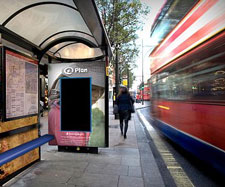redo Jump to...
print Print...
(by Allison McGinley and Lisa Bell, CBS’s ClickOrlando.com) ORLANDO, Fla. – A decade ago, in the…movie “Minority Report,” billboards spoke directly to the characters in the movie and even knew their names.
In just weeks, that science fiction plot will become reality as some businesses in Central Florida will know who you are when you walk through their door.
It’s thanks to enhanced facial recognition technology.
It’s not unusual to see surveillance cameras. They’re inside businesses, outside of homes, even on the streets. In public places, people are comfortable with knowing those cameras are there for safety, but this new technology allows cameras to not just see what people do, but know who they are.
Shops and malls across the country are already taking this a step further.

A unique new billboard, which deciphers your gender before relaying an ad, was put up at this bus stop in London last week.
There are now billboards and kiosks that cater ads to your age and demographic.
For example, if a woman was to walk up to a mall directory, a camera inside would take a photo. It will recognize her gender, age and race and instantly provide an ad for the appropriate products. So, if the shopper is a 30-year-old woman, she might see adds for makeup, shoes and clothing.
[CNET editor] Rafe Needleman believes it’s just a matter of time before stores not only to recognize you, but track your spending habits.“When you walk into a store, it might know who you are just when you walk in and give you deals based on past purchases,” said Needleman. “It’s not out of the question that 10 years from now we’ll walk down the street and people will be wearing camouflage so they’re not picked up by facial recognition trackers all over the place.”
But not everyone wants to be recognized.
And the Federal Trade Commission [FTC] worries about the time when technology becomes so advanced that your social media profiles are [scoured] for information.
Retailers would then have a face, name and maybe much more.
In fact, researchers with Carnegie Mellon University used facial recognition technology to identify college students who volunteered to be photographed for their study. By taking those photos and comparing them to photos found on social networking sites, such as Facebook, they were able to identify almost a third of them. That means they had profiles, ‘likes,’ interests and possibly family information.
Researchers took the study a step further and used other publicly available data to predict partial Social Security numbers.
As for the technology in use now, retailers say they are not saving the photos or the information that is attached to the pictures. They say they’re simply using the information to serve you better.
Banks are using it to identify customers and prevent fraud. Hotels are using it to know when honor program guests arrive. …
Copyright 2012 by ClickOrlando.com. All rights reserved. This material may not be published, broadcast, rewritten or redistributed.
Questions
1. What is facial recognition technology?
2. Where will this technology soon be used?
3. How will/do retailers use facial recognition technology?
4. What does Rafe Needleman see as the next step for retailers after facial recognition technology?
5. What concern does the Federal Trade Commission (FTC) have about technology?
6. Should retailers use facial recognition technology? Why or why not?
7. Would the use of facial recognition by retailers make you more or less apt to shop at stores that use this technology? Explain your answer.
8. a) Should any organizations use facial recognition technology to give the customer a better experience? banks, hotels, restaurants, etc.
b) Should government agencies or local governments use facial recognition for any reason? Explain your answer.
Daily “Answers” emails are provided for Daily News Articles, Tuesday’s World Events and Friday’s News Quiz.




